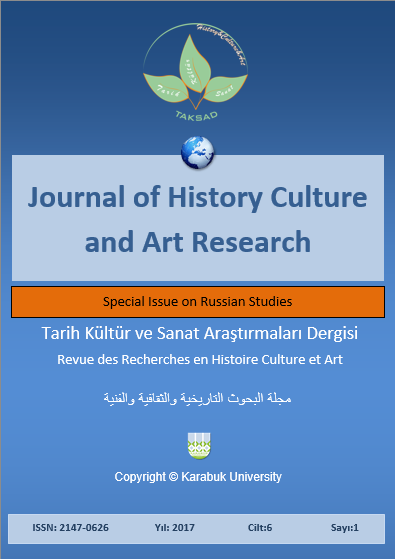Determinants of Regional University Development in Modern Russia
DOI:
https://doi.org/10.7596/taksad.v6i5.1310Keywords:
Higher education, Regional University, University development, Development determinants.Abstract
The article describes the determinants that are manifested in regional social-economic complexes and determine the main trends of development and educational activities for regional universities. The authors determined and characterized such determinants as social-economic (or financial, and infrastructural) uneven development of Russia; the economic mechanism of higher education economic accessibility stratification; the need to equalize the professional educational network in the regions of Russia to ensure the development of the intellectual and professional potential of regions and the gradual equalization of Russia economic development in terms of regional and geographical dimensions; the degree of "openness-closure" concerning a regional university and the development of understanding that a university is a system by its structural and functional organization and, consequently, the subject to the laws of social, ethnic, state and regional morphology of education; an ambiguous (often negative or neutral) attitude of teachers and organizers of higher education to innovations, which creates the contradictions and extends the periods of crisis processes in the educational system of a regional university.
References
Akinfiyeva, N. V. (2006). Social mechanisms of sustainable development management in Russian education. Saratov: Saratov University Publishing House.
Babaeva, E.; Gulyakin, D.; Magomedova, R.; Panova, I.; Pashtaev, B. & Kharchenko, L. (2014). Russian syndromes, impeding the development of the innovation processes in education. Life Science Journal, 11(9s), 184-187.
Chekmareva, V. V. (ed.) (2002). Management of social-economic processes in the regions: the role of universities. Kostroma: KSU named after N.A. Nekrasov, 2002.
Christensen, K. (2004). The innovator's dilemma. Trans. from English. Moscow: Alpina Business Books.
Christiansen, J. A. (2000). Building the innovative organization: Management systems that encourage innovation. New York: St. Martin’s Press.
Coombs, F. G. (1970). Crisis of education in modern world (system analysis). Moscow: Progress.
Dolzhenko, O. (2000). Social-cultural preconditions for the development of a new paradigm of higher education. Alma Mater University Bulletin, 10.
Filippov, F. R. (1980). Sociology of education. Moscow: Knowledge.
Gritsanov, A. A. & Abtsianko V. L. (ed.) (2003). Sociology: encyclopedia. Moscow.
Kharchenko, L. N. (2014a). Scientific and methodological support of educational service quality. Moscow: Direct-Media.
Kharchenko, L. N. (2014b). The concept of the program for university teacher preparation. Moscow: Direct-Media.
Kharchenko, L. N. & Panova, I. E. (2010). The study of university teacher readiness for the implementation of innovative activities: The world of education - education in the world. Scientific and methodical journal, 1(37), 144-148.
Kimberg, A. N. (2003). Universities: Contradictions of development. University management: practice and analysis, 1(24), 30-34.
Kirnen, M. (2004). Update or die! Trans. from English. St. Petersburg: Krylov.
Petrova, N. P.; Mareev, V. I.; Pivnenko, P. P.; Kotov, S. V.; Kotova, N. S.; Gulyakin, D. V. & Kharchenko, L. N. (2016). The Higher School Teacher Matrix of Competences. The Social Sciences, 11(18), 4539-4543.
Prigogine, I. & Stengers, I. (1984). Order out of chaos. Man's new dialogue with nature. London: Heinemann.
Problems of education affordability (2003). The series "Scientific projects of SISP - IISP Working Papers WP3 / 2003/01. Moscow: Independent Institute for Social Policy.
Subetto, A. I.; Volkova, Yu. A. & Volkova, A. Yu. (1997). Statistical and social-geographic qualimetric monitoring concerning the reproduction of intellectual potential and education in Russia. Moscow: Algol.
Zimareva, T. G. (2009). Diversification of the contradictions concerning the development of higher education in transforming Russia. Bulletin of Chelyabinsk state university, 33(171).
Zritneva, E. I.; Igropulo, I. F.; Klushina, N. P.; Magin, V. A.; Panova, I. E.; Kharchenko, L. N. & Shapovalov, V. K. (2016). Method to Estimate a Regional IHL (Institution of Higher Learning) Competitiveness. Social Sciences, 11(29), 4539-4543.
Downloads
Published
How to Cite
Issue
Section
License
All papers licensed under Creative Commons 4.0 CC-BY.- Share — copy and redistribute the material in any medium or format
- Adapt — remix, transform, and build upon the material for any purpose, even commercially.
Under the following terms:
Attribution — You must give appropriate credit, provide a link to the license, and indicate if changes were made. You may do so in any reasonable manner, but not in any way that suggests the licensor endorses you or your use.
- No additional restrictions — You may not apply legal terms or technological measures that legally restrict others from doing anything the license permits.







